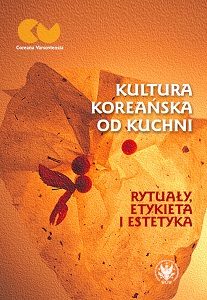Prehistoryczna i wczesnohistoryczna kultura kulinarna południowego wybrzeża koreańskiego – zarys dziejów i propozycja nowej systematyzacji badań
A New Systematization of the Korean Southern Coast Culinary Culture in Prehistory and Early History
Author(s): Jakub Taylor
Subject(s): Cultural history, Theoretical Linguistics, Applied Linguistics, Philology
Published by: Wydawnictwa Uniwersytetu Warszawskiego
Keywords: Korean cuisine; southern coast; chŭlmun; mumun; Bronze Age; Iron Age; Mahan; Kaya; Dominant Motivations’ Theorem
Summary/Abstract: The purpose of this paper is to depict the chronological change of cuisine of the Korean southern coast, namely Honam and Hosŏ regions, within the 4000BC–500AD period. The longue durée approach was implemented in the scrutiny. It was deduced that the transformation, which the Peninsular table d’hôte was undergoing in the above timeframe, was caused mainly by bringing in and forfeiting new methods of exploiting the ecological niches through the contact with the neighbouring archaeological cultures. Said intertwining was done on a local and wider regional scale, it was facilitated by the strategically focal position the coastal entities were holding, namely the territories along the most important sea route of North-East Asia. Numerous archeological sites, reconstructed bushcraft ‘know-how’, and the changing features of the utensils linked to food collection, preservation and preparation were described. Cereal grain crop-centered developmental theories were viewed with skepticism, long-lasting traditions were emphasized. In the second part of the paper, the author attempted to use the General Systems’ Theorem and a System of Dominant Social Motivations’ Theorem (both developed by the Polish School of Cybernetics) to adjust a newly created narrative matrix to the topic of ancient Korean cuisine.
Book: Kultura koreańska od kuchni. Rytuały, etykieta i estetyka
- Page Range: 77-120
- Page Count: 44
- Publication Year: 2021
- Language: Polish
- Content File-PDF

